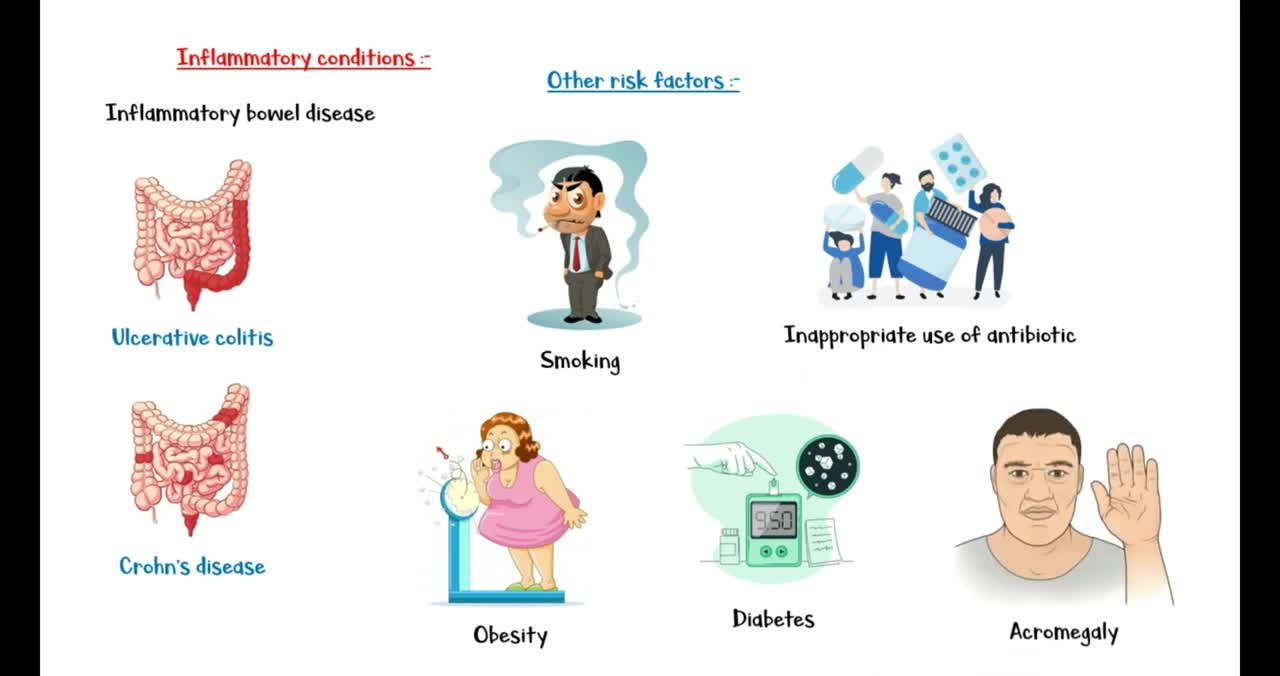Premium Only Content

Colon Cancer _- Causes, Risk Factors, Signs & Symptoms
Colon cancer, also known as colorectal carcinoma, is the most common type of gastro intestinal cancer, and is the 3rd most common cancer worldwide. The incidence of new cases & mortality from colon cancer has been decreased over the past few years, possibly related to the increase in cancer screening, & better treatment modalities. Colon cancer affects both sexes equally.
Colon cancer has a multifactorial etiology. Meaning that several factors together contribute to the pathogenesis. These factors include genetic factors; Environmental factors, mainly the diet; And inflammatory conditions affecting the gastro intestinal tract. Genetics plays a major role in colon cancer. Family history of colon cancer carries a higher risk of developing the condition. Two most common inherited colon cancer syndromes include; Familial adenomatous polyposis; And Lynch syndrome. However, it is important to note that apart from these syndromes, there are many other genetic mutations can lead to the development of colon cancer.
Environmental factors related to the development of colon cancer include the following. High consumption of red meat, organ meat, and animal fat. Low fiber diet. Low intake of fruits & vegetables. High alcohol consumption. And high fructose corn syrup.
Primary inflammatory condition associated with colon cancer is inflammatory bowel disease, which has 2 entities, Ulcerative colitis; And crohn’s disease. Other risk factors for colon cancer include the following. Smoking. Inappropriate use of antibiotics. Obesity & metabolic syndrome. Diabetes. And poorly controlled acromegaly disease.
Now let’s see some common signs & symptoms of colon cancer. Because of increased emphasis on screening practices, colon cancer is now often detected before it starts to cause symptoms. However, in more advanced cases, patient may experience following clinical features. Iron deficiency anemia due to chronic blood loss. Rectal bleeding. Abdominal mass. Intestinal obstruction.
Changes in bowel habits, such as constipation, or diarrhea; And loss of appetite. In addition, there may be a palpable mass in the abdomen. Patient may also have hepatomegaly, or enlargement of the liver; And fluid build up in the peritoneal cavity, also known as ascites.
#ColonCancer #ColonCancerSymptoms #EarlySigns&SymptomsOfColonCancer #MedToday
-
 1:25:29
1:25:29
Sarah Westall
12 hours agoX-Files True History, Project Blue Beam, Cabal Faction War w/ Former FBI Agent John DeSouza
93.9K18 -
 7:03:49
7:03:49
Dr Disrespect
19 hours ago🔴LIVE - DR DISRESPECT - NEW PC VS. DELTA FORCE - MAX SETTINGS
180K29 -
 49:04
49:04
Lights, Camera, Barstool
1 day agoIs The Monkey The Worst Movie Of The Year?? + Amazon Gets Bond
81.5K5 -
 24:19
24:19
Adam Carolla
1 day agoDiddy’s Legal Drama Escalates, Smuggler Caught Hiding WHAT? + Philly Eagles & The White House #news
158K21 -
 10:12
10:12
Mike Rowe
2 days agoClint Hill: What A Man. What A Life. | The Way I Heard It with Mike Rowe
142K17 -
 1:31:52
1:31:52
Redacted News
15 hours agoBOMBSHELL! This is war! FBI whistleblowers reveal Epstein files being destroyed? | Redacted News
209K390 -
 48:55
48:55
Candace Show Podcast
15 hours agoSTOP EVERYTHING. They FINALLY Mentioned ME In The Blake Lively Lawsuit! | Candace Ep 152
179K136 -
 1:02:51
1:02:51
In The Litter Box w/ Jewels & Catturd
1 day agoWhere are the Epstein Files? | In the Litter Box w/ Jewels & Catturd – Ep. 750 – 2/26/2025
122K91 -
 1:59:06
1:59:06
Revenge of the Cis
17 hours agoLocals Episode 198: Suits
99.7K16 -
 1:38:56
1:38:56
SLS - Street League Skateboarding
1 day agoTop Moments from the Second Half of the 2024 SLS Championship Tour! All The 9’s 🔥
69.8K2